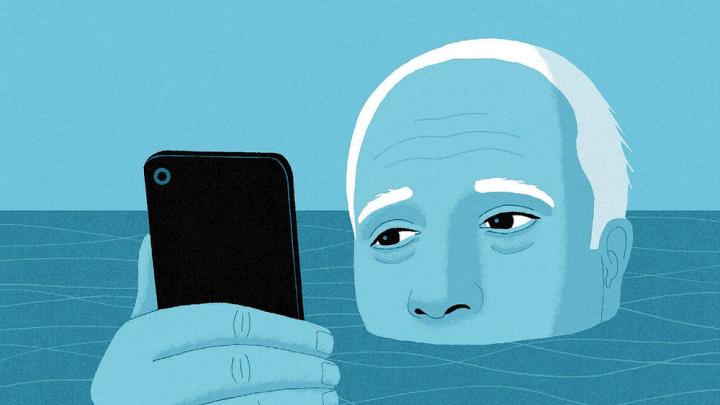Parenting teenagers in 2022 generally entails worrying about their use of platforms such as Instagram, Snapchat, and TikTok; multiple studies point to links between social-media use and anxiety and depression among children and adolescents. Yet a new study reveals similar associations between depression and social-media use for their parents and grandparents too.
The findings come out of the COVID States Project, a series of surveys of adults in all 50 states, which began in spring 2020, soon after the pandemic began. It’s led by a multidisciplinary team of researchers from four universities, including Roy Perlis, the Dozoretz Professor of Psychiatry at Massachusetts General Hospital and Harvard Medical School, and John Della Volpe, director of polling at the Harvard Kennedy School’s Institute of Politics. For this study, they identified more than 5,000 people, with an average age of 56, who showed no signs of depression as measured by a standard screening. Participants initially were asked if they use social media. When surveyed again later, those who used Snapchat, Facebook, and TikTok were more likely to report symptoms of depression.
“Most of the prior literature focused on kids or young adults,” Perlis explains. “But in 2022 older adults also use social media, and we know almost nothing about the relationship between social media and anxiety and depression in older adults.” Such questions feel particularly pressing given the mental-health impact of the pandemic. “Rates of depression and anxiety were very high early in the pandemic,” he says, “and they’ve remained about three times greater than they would be normally.”
Findings about mental health and social-media use can be tricky to interpret. Most studies can’t prove that using Facebook or Instagram causes depression, Perlis cautions. These studies often capture a single moment in time and show that people who use social media report more symptoms of anxiety and depression. This may mean that being anxious or depressed makes a person more likely to engage with social media. Or, “maybe people who use social media are more prone to depression because the same sort of traits or personality, characteristics or feelings, the same things that make them more apt to use social media also make them more apt to become depressed,” he suggests. Perhaps social-media users get their news in a format that offers less balanced coverage or promotes “doomscrolling,” dampening mood in the process. Maybe “they are using social media instead of seeing other people,” Perlis offers, “or they’re using social media because they don’t have social supports in the real world.”
This latest study still can’t explain what triggers depression among social-media users, he acknowledges, but it “lets us start to cross off alternative explanations for the relationship that we’ve seen.” The researchers knew the study participants were not depressed when the study began, and since it was conducted over time, it enabled them to see the depression symptoms appear. Their analysis also showed that the participants’ news sources, number of social supports, and face-to-face time with others did not meaningfully affect their levels of depression.
In an intriguing set of findings, the researchers identified links between particular social-media platforms and depression in certain age groups. For example, Facebook use was associated with depression among people younger than 35, but not for those over 35. In the over-35 group, TikTok and Snapchat were connected to depression symptoms. “I think we have more work to do to understand why the associations are so different across different age groups of adults,” Perlis says. “I would say that was the thing that made me the most eager to do follow-up studies and try to understand what’s going on.”
Although the study can’t confirm why social media might be linked to depression, Perlis speculates that “what seems to be the case in kids is probably true in adults: constantly looking at images of people who appear to be happier than you, and more successful than you, who generally seem to have a better life than you, certainly doesn’t make most people feel better.” A barrage of negative images isn’t likely to help either. Social media is like “drinking from a firehose,” he says, in contrast with older forms of media, which offer smaller doses of potentially harmful images.
As a neurobiologist, Perlis says this work falls outside his typical research areas. “I spend a lot of my time in the wet lab making stem-cell models of brain diseases,” he explains. But when the Kennedy School’s Della Volpe asked him to join the COVID States project to consider issues such as mental health and social-media use, he felt compelled to say yes. “I come at this as a psychiatrist, an epidemiologist, and a parent,” he says. “I wonder every day when I see my kids on their phones: What’s this doing exactly? How much is okay? As with so many other things, there probably are levels of use that are perfectly okay, and a point where maybe it becomes less healthy.” Answering all the unknowns about social media and mental health, including the question of “how much,” Perlis adds, requires future research.
He’s hoping to motivate “others who have been working closer in this area” to dive into such questions. If social media are being used by people who are vulnerable to mental-health problems, perhaps these platforms can be used creatively to reach them and provide help when needed, Perlis suggests. “How do we use social media to encourage healthy behaviors, so it potentially contributes to public health? That’s the sort of work that I’d like to see done.”








